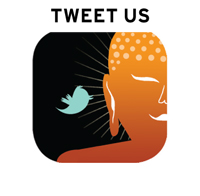The Hard Truths
Thank you for Mary Talbot’s beautiful reflection on parenting (“The Dismay of Motherhood,” Spring 2014), which came to me at a much-needed moment. Her insights are extremely helpful in identifying, and then understanding, how much falseness is built up around parenting, how damaging that falseness can be, and how important the hard truths of life and death really are. If we can see and come to terms with samvega and its many daily and lesser manifestations, our parenting will be better. Or so I hope.
—Anne Coldiron
Tallahassee, FL
The Hell of Samsara
Mary Talbot’s “The Dismay of Motherhood” may be one of the most important articles Tricycle has ever published. Though Talbot does not directly confront the issue herself, she references one that is central to Buddhist thought and practice. The inner logic of samvega that Talbot talks about would suggest that we don’t have the moral permission to impose the processes of aging, sickness, and dying on another person. But by bringing a child into this world, this is exactly what we do: expose them to the “hell of samsara” (Talbot’s phrase) for the sake of our own self-gratification and self-aggrandizement. No child has ever asked to be born, and despite whatever gloss we put on our own stories as parents, the dukkha [suffering] of having a body continues for the child, and gets replicated in each generation.
My own reading of Buddha’s teaching is that his ultimate concern, within the context of suffering and the end of suffering, was not with fornication but with reproduction. Buddha’s compassion is not only for the living but also for the unborn. It is incumbent upon every serious Buddhist practitioner to engage with this issue: to what extent are they conveyors of dukkha for a child born into samsara?
—Mu Soeng
Barre Center for Buddhist Studies
Barre, MA
Science’s Younger Brother
As Curtis White states in his interview with Linda Heuman (“The Science Delusion,” Spring 2014), scientism has become the analytical, political, and linguistic water in which we swim—we fish do not even notice it. To this fish, scientism is much like a younger brother that is always right, but not very helpful when we are faced with problems that cannot be solved by mathematical formulae and spreadsheets. Buddhism, as far as I can judge, makes me feel like it is more important to be helpful than to be right.
—Wayne Pearce
Hershey, PA
The Best of the Best
I am quite grateful for Tricycle’s willingness to address Buddhism’s encounter with modernity in such depth. I know by now that any article by Linda Heuman is going to be of lasting importance, and her interview with Curtis White certainly doesn’t disappoint.
Erik Braun’s article on the origins of what Bhikkhu Sujato calls vipassanavada, or “vipassana-doctrine” (“Meditation en Masse,” Spring 2014), is equally important and thought-provoking. All in all—and I don’t say this lightly, given Tricycle’s long history of great writing—I think the Spring 2014 issue may be your greatest ever. Thank you so much for all that you do.
—Kevin Knox
Anacortes, WA

Meditation’s Privileged Seat
Thank you for Erik Braun’s article “Meditation en Masse.” For the past 10 years or so, I’ve been conducting courses in the teachings of the Buddha in our local university’s continuing education program, at a maximum security prison north of the city, at several churches and synagogues, and, occasionally, at one of the few self-consciously Buddhist meditation centers in our Midwestern town. In every course, all our texts are from the Pali canon, and I make it clear at the beginning of each course that this is not about “Buddhism” but about a distinctively insightful, historically unique, and rationally coherent body of teachings that can be helpful in developing an understanding of experience and a mode of living that can lead to increased happiness and equanimity.
Meditation, in the form of voluntary self-isolation for periods of time and purposeful contemplation of what seems to be important, certainly represents a major theme in the suttas; it comes up so regularly and plays such a central role that it’s extremely unlikely to have been a theme added by the sangha between the Buddha’s death and the recording of the canon. But it is one theme in a vast symphony of interlinked ideas that comprise a doctrine—dhamma, Buddha-sasana, dhamma-vinaya—that distinguishes the Buddha’s teachings from those of any other sage or tradition I’ve encountered. That Buddhist modernism has privileged meditation as the central element of those teachings is sad and wrong.
Meditation is part of learning, whether you’re learning medieval history or the Buddha’s understanding of causation. If we devote our lives to meditation, sitting in large groups at meditation centers or retreats, we may experience a reduction in anxiety; we’ll probably bring our heart rate down and possibly our blood pressure as well; and we may become better employees or executives. But I’m not sure how much we learn from the meditation experience itself about how the world works, how experience emerges, or how to determine what the next right thing to do is and how to do that most skillfully. It’s that kind of learning that’s important to me, and it’s the help I get in learning those things that brings me back, again and again, to the teachings of the Buddha.
—Richard Blumberg
Walking the path toward the complete ending of clinging and suffering is the noblest thing a person can do.
-Tricycle Magazine (@tricyclemag)
Yeah and it’s really really hard.
-Veronica Pedrosa (@Vpedrosa)
New to Twitter? Follow me! And follow some others: suggestions, @tricyclemag and @RichardDawkins (OK, a odd couple. . .)
-aqk (@aqk)
Send letters to editorial@tricycle.com, post a comment on tricycle.com, or tweet us at @tricyclemag.
Illustrations by Roberto La Forgia
Thank you for subscribing to Tricycle! As a nonprofit, we depend on readers like you to keep Buddhist teachings and practices widely available.

